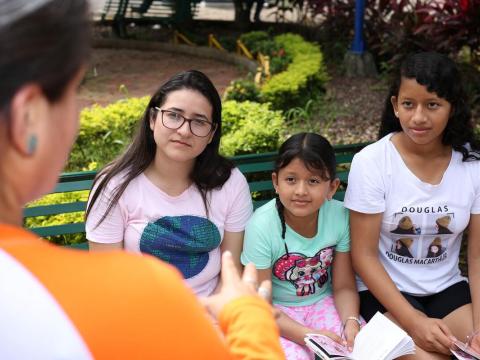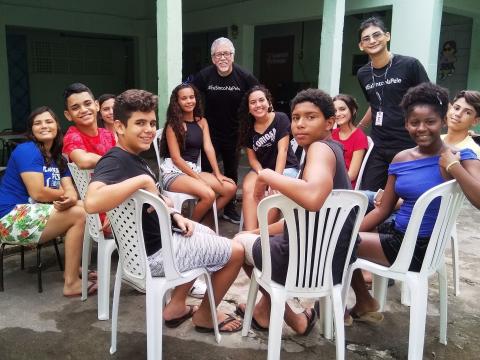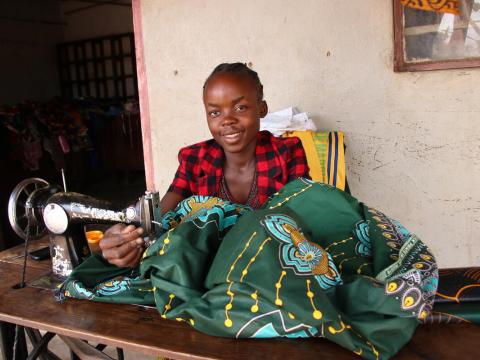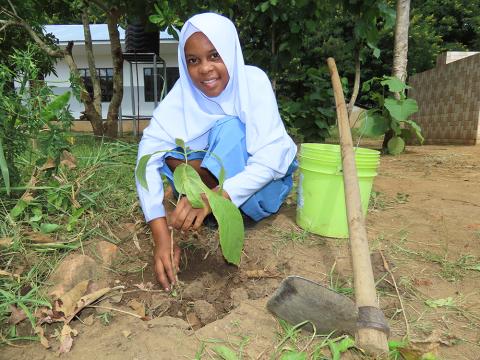
Don’t fear the teen! Let’s turn our perspective of adolescents upside down.
As Julia Smith-Brake prepares for the Women Deliver event in July 2023, she ponders the joy and love she shares with her pre-tween daughter, and how programs like World Vision’s Positive Youth Development help children enter adolescence to become healthy, peaceful, young adults; rather than “problems to be solved.”
As the parent of an 11-year-old girl, I am proud that she loves foraging in nature, learning to play the drums, rock climbing, and always asking “How you are doing?” with real interest. Sometimes, when I tell strangers about my daughter, they respond with, “Oh, poor you! The teen years are coming, you must be scared!”
The reality is, however, that parenting children of any age can be both scary and full of joy. But I think people offer these words truly because they think adolescents are scary! People often think teenagers are disrespectful, rebellious, and risks to their own well-being. In fact, many view adolescents as problems that we need to solve.
Of course, adolescents around the world face challenges, are uniquely vulnerable; girls are forced or coerced into child marriage in many countries, boys are frequently at risk of violent bullying, and both boys and girls often face pressure to drop out of school. All of these experiences compound exponentially during times of conflict or disaster. But how we address these problems should be done from a place of considering the adolescents’ strengths, and not their deficits. Let’s turn our perspective of teens upside down.
World Vision works alongside adolescents and their communities using an approach called Positive Youth Development. Positive Youth Development is not a one-way process where adults ‘pour’ into adolescents for them to grow. Rather, adolescents play a vital role in their own development, also influencing the people around them. With evolving values and capacities, adolescents interact with others around them and, with the support, opportunities and resources available to them, a dynamic interaction takes place.
Adolescence is a time of immense growth and change; it is also a time when social norms, both positive and harmful, are more fully internalized and begin to be practiced independently. Each interaction adolescents have with peers and adults affects their development in either positive or negative ways. Unfortunately, unequal gender relations can take form in adolescence; on the other hand, this period in a young person’s life can also be a huge opportunity for them to form healthy and peaceful relationships and to challenge the harmful norms they may observe in their environments.
Positive Youth Development is a strengths-based approach. It differs from traditional programming in that it does not focus on what is ‘broken’ in young people. Instead it focuses on adolescents’ strengths, skills, and possibilities. It affirms positive outcomes for adolescents through productive activities and healthy relationships. It focuses on building on the capacities already present.
Adolescents are not problems to be solved, they are leaders and partners to be catalyzed. If we focus on their inherent capacities and help them grow from there, adolescents have the potential to not just transform their own lives, but to build powerful networks to influence their communities and governments and transform unequitable systems.
World Vision has the immense honour of working alongside many young people who are leading and partnering with us to end many forms of gender inequality and gender-based violence. World Vision’s Changemakers are adolescents building skills and collaborating with others to end violence, including child marriage and sexual violence and harassment. Male Action Groups in Uganda are made up of teenage boys mobilising men and boys in ending violence and promote gender equality. Girls from across many African nations have raised their collective voice in a Girls’ Manifesto for gender equality to release at Women Deliver 2023. Individuals, groups, and networks of adolescents across the world are building their strengths and raising their voices. Let’s join them!
Am I scared I will make mistakes as a parent to my up-and-coming teen? Sure. But I am not afraid she will be a problem I need to solve. And whatever fear I have as a parent is far outweighed by the excitement to see her flourish, discover who she is, explore her environment, and to do everything I can to support her, show her empathy, challenge her growth, share power and space with her, and expand possibilities for her to connect with the world.
To learn more about World Vision's engagement in this year's Women Deliver event click here
Julia Smith-Brake is the Senior Adolescent Programming Specialist with the Global Centre’s Education team and has been working in Adolescent Programming at the GC since January 2020. She is passionate about meaningful adolescent participation, amplifying their voices and including their input and engagement in World Vision's decision-making and approaches.


